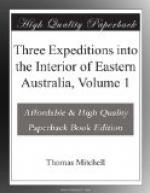The pic of Tangulda lay due north of our camp, distant about two miles; and in the afternoon I set out on foot to ascend it, accompanied by Mr. White and the carpenter. On approaching its base, the bold rocks near the summit were reddened by the rays of a sun setting in smoke; while the whole mass of woody hill below that summit seemed more imposing, as it overhung a level country, which had no visible horizon. We reached the top at a little after four P.M. by a steep and rocky ascent; and although the atmosphere was dim, the view was very important. I saw the Namoi’s course through a cluster of hills, between which it passed to a lower country in the north-west. These hills were connected on the right bank with the pic on which we stood, and with a low range in the east and north-east, whose western extremities appeared to terminate on the vale of the Namoi, as far northward as I could then see them in perspective. The Barber had positively stated that the only practicable way to the big river was north-east by north from Tangulda; and it now appeared that the lowest part of this range lay exactly in that direction. Some bold and remarkable hills appeared at no great distance to the right of that line; but the country between Tangulda and the lowest part of that horizon seemed so level or gently undulating that I felt it my duty, before I traced the Namoi further, to explore the country in the direction so particularly described by The Bushranger. On my return to the camp in the evening, I made a drawing of the eel-fish, which we had caught early in the day. (Figure 2 Plate 6.)
December 18.
We now quitted the line of the Namoi, and proceeded in the direction north-east by north from Tangulda. We thus continued our route in a straight line up a long valley, until at ten A.M. we reached the crest of the low range previously mentioned. The rock consisted of a calcareous breccia, with water-worn pebbles. The carts had ascended to the crest without difficulty, and the descent to the country beyond was equally favourable. Halfway down, the dogs killed a female kangaroo, with a nearly full-grown young one, which she retained to the last, within her pouch. The death of no animal can excite more sympathy than that of one of these inoffensive creatures. The country beyond the low range was more open for two miles; the only trees being ironbark.
CUTTING THROUGH A THICK SCRUB.
At 15 miles we met an impenetrable scrub of forest oak (casuarina) through which no passage appearing near, we were compelled, hot as the day was, to cut our way with axes where the trees were smallest and least numerous. We thus cleared our course for a mile and a half, when we had the good fortune to see once more an open forest before us, and after a journey of eighteen miles the party encamped on a dry watercourse, but without much prospect of finding any water. We had carried eleven gallons from our last camp, but the men had already experienced the full benefit of this, in cutting through the scrub, during a hot wind, after having travelled fifteen miles.




